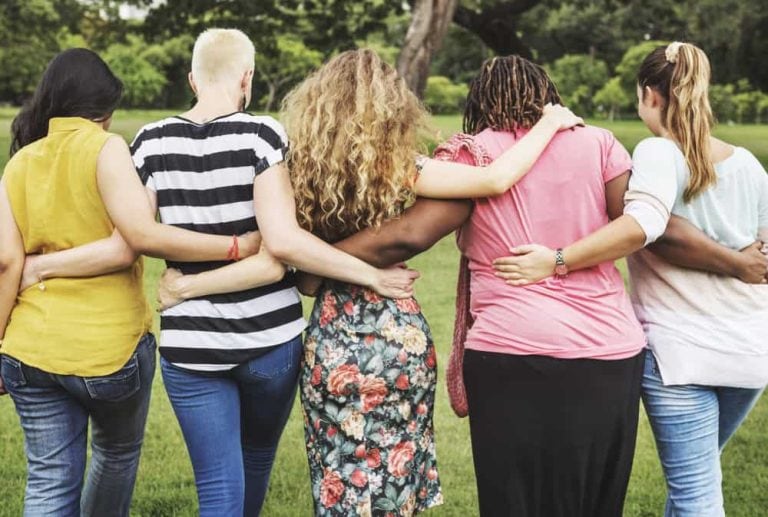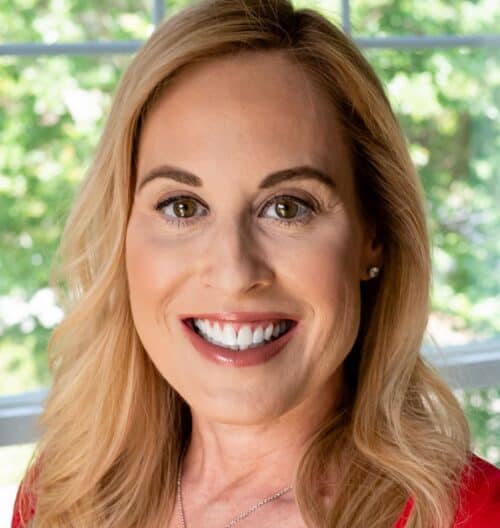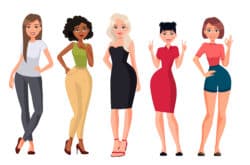A year after separating from my “was-bund,” the type of relationship I’m craving the most isn’t romantic – it’s platonic.
Instead of being surrounded by close, intimate friends, I feel like I’m alone on an island. That’s because two years ago, I moved to North Carolina, where my ex attended college. At first, I loved having instant friends in my new town, but when we split, most of my local connections were with people he’s known since the ‘90s, and I wasn’t sure who to trust. Other than a few close friends who live hundreds of miles away, I’m starting my friendship journey from scratch at 43.
It’s no secret that loneliness is a health hazard. In fact, research suggests that the price of social isolation – which increases the risk of death from all causes – rivals that of smoking, obesity, and physical inactivity. On the flip side, strong friendships later in life are important not only for our psychological well-being, but for our cognitive functioning and physical health as well. The good news? It’s possible to build up friendship reserves at any stage of life.
Here’s how to nurture existing relationships and open the door to new connections, according to experts.
Why mindset matters when looking for new friendships
Divorce can make us feed our insecurities and increase our fear of rejection. But friendship has a lot to do with our state of mind, and assuming that people like us often becomes a self-fulfilling prophecy, said Marisa Franco, Ph.D., a psychologist, friendship expert, and author of “Platonic: How the Science of Attachment Can Help You Make–and Keep–Friends.”
According to risk regulation theory, we are either in self-protection mode or pro-relationship mode, Franco explained. In self-protection mode, we don’t initiate, we aren’t vulnerable, and we aren’t generous, she said. The consequence? We harm our relationships. But in pro-relationship mode, we’re affectionate, we’re generous, and we’re vulnerable – this conveys to people that we trust them, and that it’s safe for them to invest in us.
“The people that are best at connection are the ones who make other people feel like they belong. Happiness is a great resource for connection because we are naturally in more of a pro-relationship mode,” Franco said.
How do we get there? By taking in the good, even when times are tough. For example, when someone smiles at you, pause, and register it – let it stir something in you, Franco said, adding, “I like to take a deep breath and continue to think about that smile until my exhale ends.” Over time, this will help you be more positive and hopeful, and that’s an important aspect of preserving friendships.
Sustaining existing relationships
If we let our friendships take the back burner during our marriage, getting divorced can leave us feeling disconnected at a time when we really need the love and support of friends, said Shasta Nelson, a friendship expert and author of Frientimacy: How to Deepen Friendships for Lifelong Health and Happiness.
But even if you haven’t prioritized your platonic relationships, Nelson said that divorce is a great opportunity to start. First, identify current friendships that you want to maintain and have an honest conversation with these friends about your divorce – what happened and what went wrong, she said.
But don’t dump everything on your pal at once. Vulnerability should be incremental, Nelson said. Share a little bit about your situation and observe how your friend is responding to it. If they’re coming from a place of acceptance that leaves you feeling more understood and loved, keep leaning into the relationship, she suggested.
For friendships to endure, the key is to be sensitive and thoughtful about how you’re showing up. Even though this huge thing is happening in your life, you should take an active interest in your friends’ lives, too. That means letting them know it’s okay to be happy and share good news with you even if you’re struggling. “Friendships won’t survive if it’s just constantly about us and our lives,” Nelson said.
Sparking new connections
The friendship pool feels much smaller after a divorce, said Franco, who recommends seeking out other “transitioners.” For example, people who’ve recently moved to your city, are also going through a divorce, or are retiring – they tend to be more open to friendship at any age, Franco said.
You’re at a stage in your life where you might think, Okay. I have more time. I need to go out and start getting to know people, Nelson said. But we’re never going to become close to somebody unless we have consistent time with each other, so think about things you want to do where you can interact with the same people consistently, she suggested. Maybe that means joining a tennis club, signing up for a cooking class, or attending a divorce support group. Either way, pursuing your interests in this way will present the opportunity to forge new friendships.
Now is also a great time to strengthen your connections with casual acquaintances who’ve also gone through a divorce. “One of the cool things is that it suddenly gives you a new shared area of vulnerability with people. It gives you an opportunity to share stories, to hear their wisdom, or to learn from them, and that can be very bonding,” she said.
Nelson emphasized the importance of knowing how to approach a brand-new friendship vs. an existing one. In a budding relationship, we can talk about the fact that we’re going through a divorce, but that shouldn’t be the main theme of our interactions. The bulk of our exchanges should be an easy give and take, simply enjoying the process of getting to know one another.
The most important thing to remember in friendships, old and new, is that both parties need to come out of an interaction feeling good about their lives, Nelson said.
For me, changing my mindset has been key – instead of assuming someone won’t like me, I’ve been focusing on making every interaction positive. Not giving into that fear of rejection is still a struggle, but I’ve been approaching each of my relationships from a more positive place. As a result, the new friendships I’m building are more authentic and joyful.






